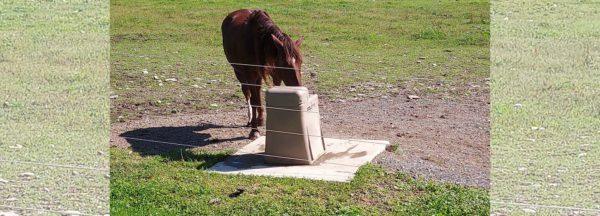Rethinking Water Use and Conservation

By Ritchie Industries
Here is a quick thought experiment. Consider how much feed, hay and water are consumed by your horses every year. Then calculate how much those items cost throughout the year. It is probably fairly simple to account for your hay and feed costs; however, your water costs might be harder to calculate. You have the simple calculation of how much water is consumed by your horses but there are lots of additional water uses that are not as simple to monitor – water wasted cleaning out tanks or buckets, water used to launder blankets and other gear, water used to clean barn stalls or equipment, water used to control dust in arenas or paddocks, water used to maintain landscaping and/or pastures and water used to cool down or bathe your horse. Every drop adds up and, depending on where you live, it can add up to cost a pretty penny.
Adopting Environmentally Friendly Practices Can Help Offset Horse Ownership Costs
According to Donna Coffin, Extension Professor at the University of Maine Cooperative Extension, it costs on average between $5,238 and $6,898 to care for a hobby horse each year (based on 2023 prices). This figure does not include property or land ownership costs.
Now more than ever, responsible horse owners, ranchers, trainers and breeders are adopting proven conservation practices to reduce the environmental impact and protect the health of the land. An area of particular emphasis from coast to coast is water conservation, especially in drought prone areas.
Automatic Waterers are a Simple and Efficient Way to Conserve Water
Karen Myers of Myers Performance Morgans located in Binghamton, New York, has been around horses for over 50 years and has been raising and breeding Morgan horses since 1990. She owns and operates the Myers Performance Morgans horse farm that at its peak can accommodate up to 60 horses during breeding season, operates as a training and boarding stable and offers a riding arena.
Myers has one well on her farm that provides water for the entire operation. Three years ago, she installed five Ritchie green Omni 2s, two Classic Equine by Ritchie Ultra Fount 2s and three Classic Equine Ultra Fount 1s to help conserve water and provide clean, fresh water on demand to her equine athletes and other horses stabled on the farm.
The results amazed her.
“These Ritchie waterers have been a godsend to me and the entire farm,” said Myers. “If I still had 100-gallon tanks in the field, I am not sure that I would still have a functioning well right now. We used to waste a lot of water dumping tanks that had turned green with algae, scrubbing and rinsing them out and then refilling them. This process would create mud around the tanks which did not help with the fly population. We had our tanks set up on a staggered system to refill them, but it was still a constant pull of 300 gallons or more a day from our one well. Not to mention the labor and time saved. The Ritchie automatic waterers also reduced the risk of someone leaving a tank unattended during filling and having it overflow or run for hours. It is year-round savings of time and water, no matter the season. I love that we don’t have to knock ice out of tanks or tubs during the cold weather.”
Myers conservatively estimates that the 10 Richie waterers have reduced water waste by over 44,000 gallons of water a year on the farm. If Myers were on city water with Binghamton, New York, that would amount to a savings of $880 a year (calculated at a rate of 2 cents per gallon). This water use reduction can go a long way in prolonging the life of her well.
According to the U.S. Geological Survey, approximately 15% of Americans get their water from a private well. A properly drilled well has an average lifespan of 30 to 50 years, which can be extended by conducting regular inspections, performing maintenance and managing water use.
Explore Other Ways to Reduce Water Usage on the Farm
Myers is committed to water conservation and is constantly searching for new ways to reduce her farm’s water use. This includes sending out all blankets and gear to be laundered offsite and using collected rainwater or cistern water for general facility cleaning, sponging horses in the summer, and basic landscape watering. Myers is quick to point out that the majority of the landscaping is hardscapes with select planters to help reduce water usage.
“We really try to conserve as much water as we can because I want to keep my well running for as long as possible,” said Myers. “The one thing that I would change about my farm is the fact that I should have put Ritchie waterers in sooner. I wish I had done this 15 years ago. They are so easy and quick to clean, use minimal water in the bowl, the water is consistently at 54 degrees Fahrenheit, they reduce your labor and knowing that your horses have fresh water when they want it is great. The horses love the Ritchie waterers and I absolutely love these waterers. I also love that Ritchie is a company that manufactures their products here in the United States.”
For more information visit: RitchieFount.com
Since 1921, Ritchie waterers have provided worry-free water solutions for horse owners across North America. Made in the USA and backed by the best warranty in the business, Ritchie waterers are the perfect way to conserve your water and keep your horse’s water cool, fresh, clean and on demand throughout the year.
